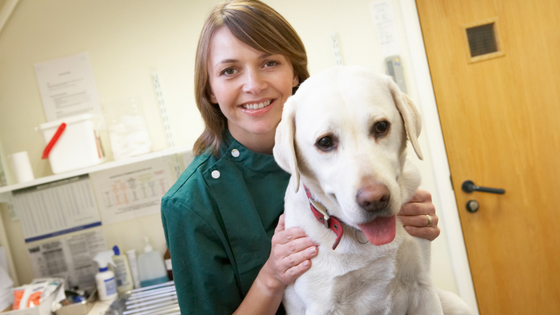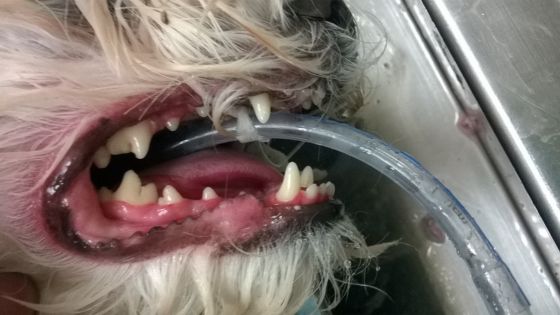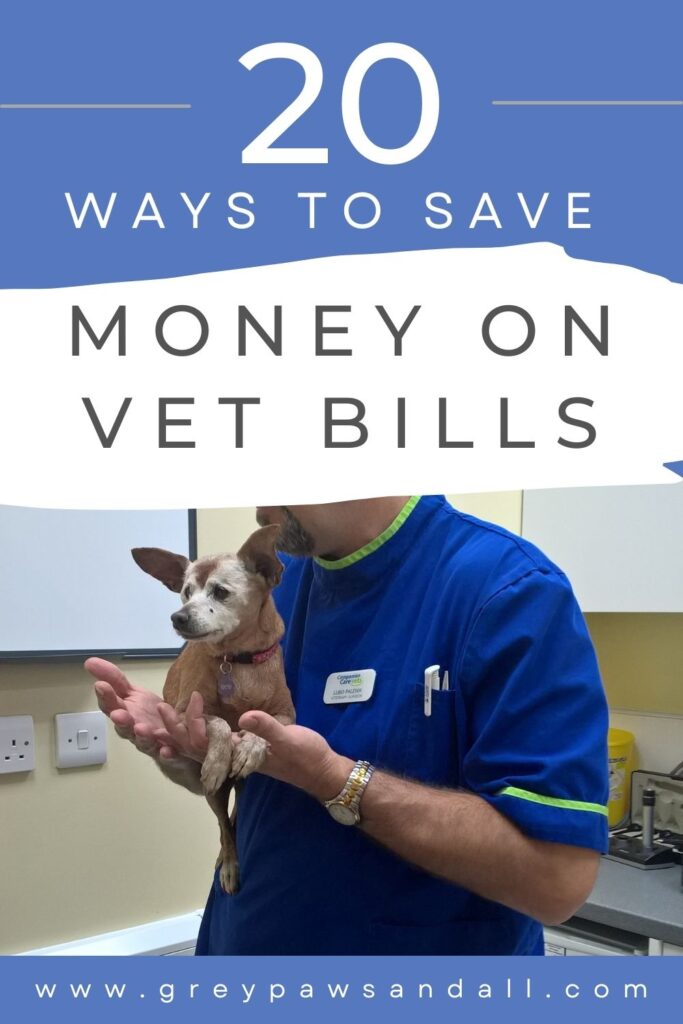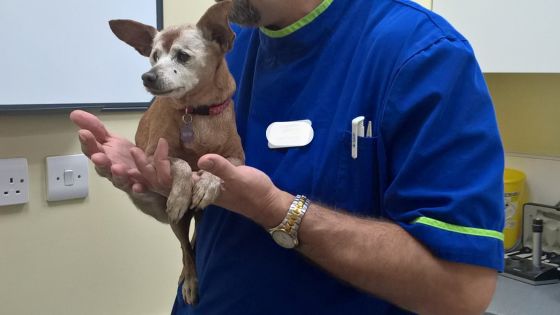I don’t know about you, but my vet bills are astronomical!
From buying medication online and keeping an eye out for special offers, to feeding a nutritionally balanced diet and maintaining a healthy weight, these are just a few ways to save money on your vet bills.
I rescue old dogs with issues. What can I say, they’re the ones I truly love that make my soul soar. They’re also the ones that cost a lot of money. The reality is, it’s not only old dogs that are expensive.
Several years ago, we fostered a young dog we named Jack. My husband was in love so we adopted him. I talked about health insurance, but my husband thinks all insurance is a scam so I dropped it. I also couldn’t believe anything serious would happen to such a young dog.
Guess what! One day Jack’s back legs stopped working, and the bill for an MRI, spinal surgery and hospital stay was £5,000 in one hit (roughly $6,200.00USD at the time).
Imagine if we had insurance!!
We’re all Feeling the Pinch!
As my dogs developed health issues and medication bills skyrocketed, I started looking for cheaper places to buy. There was also a lot of talk in my FB group from members who were struggling with the cost of care. I decided to write this post as a way to share ideas and help others reduce some of their expenses.
Although I wrote this with senior dog care in mind, the advice will help no matter how hold your dog is or even what time of animal you have.
20 Ways to Save Money on Vet Bills
1) Leave a money hungry practice
I fell victim to this when I first moved to Florida, and was searching for a vet. To be honest it took me a long time to realise how money driven they were, but when it finally sank in, I left as soon as I found someone new.
This was a well-known animal hospital that was highly recommended by a family member, so I trusted I was in a good place.
The first thing that started to annoy me was how I was greeted. At the beginning I thought “how friendly all these receptionists were, yelling hello before I even got to the front desk.” After a few visits I realised how phony this display was. Come on, I had been there several times and yet they never seemed to recognise me!
I also started noticing how pressured I felt by the vet I was seeing, and even when I changed vets, I got the same treatment. They would constantly recommend the most expensive and invasive tests first, rather than starting with something as simple as a urine test for example. Are businesses in it to make money? Of course. That doesn’t mean you should skip to step 4 when you haven’t done step 1 yet.
My cat TT was being treated for cancer at that hospital, and the oncologist couldn’t have been nicer…as long as I said yes to everything. Let me explain. After the first chemo drug stopped working, I agreed to try a second. When that one stopped, I said no more.
I take amazing care of every animal I share my life with, but I don’t believe that just because there is something to be done, it’s morally or ethically right to do it in every situation. Well, the attitude certainly flipped when I refused to put him through any more treatment.
Here’s what finally woke me up. One day it seemed like TT had a seizure, obviously due to the tumor. I jumped in the car and rushed him over to the animal hospital. It was time to let him go. The nurse came and took him to get him ready. Here I am, devastated at losing my cat, preparing myself to say goodbye when a receptionist walks in to take payment. They wouldn’t bring him back until the bill was paid. There are no words, even now, to describe the horror of that moment.
I was so furious by everything that had gone on since becoming a client, I had a meeting with the head of the hospital. It was obvious from the second I sat down he had no interest in what I had to say, defending every vet’s action. It was then I finally realised, they had a lot of expensive equipment and staff to pay for and the bottom line was evident in everything they did.
Since that experience I have become very cautious, and I’m no longer afraid to question.
NOTE: Sorry, I didn’t realise this one section was going to turn into its own article, but this is such an important topic to address.
2) See your vet regularly

Vet appointments cost money, but it’s also a chance for your vet to catch a problem before it becomes serious and more expensive to treat or manage.
3) Discuss diagnostic and treatment options
It’s important to have an open and honest conversation with your vet, from the beginning. Obviously you’re going to do the very best you can, but very few of us are made of money, so you are perfectly within your right to bring up that subject.
Diagnosing a problem – Sometimes a problem can be diagnosed with a simple urine test, other times it can’t. Discuss what tests/procedures are needed, and can you start with the simpler things like a urine test for example, then work your way up.
As I shared my experience above, some vets will start with the most expensive and invasive, so you need to be clear in advance.
Treating a problem – Once your vet has a diagnosis, he’ll have a treatment plan set out. Find out the options, costs, is this short term or long term, are there generic versions, alternative treatments…
4) Request a written estimate before treatment
Expanding on the section above, before any test or procedure is carried out (as long as it’s not an emergency of course), ask for a written estimate. Remember it’s only an estimate, but at least you’ll have a ball park figure of what to expect. Clarify if the final bill could be higher, depending on what they find.
For a recent dental surgery my vet went over an itemised list of what is typically required. Some things he was able to eliminate, while others depended on what he found during surgery. The bill was slightly higher than the estimate, but that’s because teeth needed to be extracted and I was forewarned it would be a possibility.
5) Take care of your dog’s teeth

This one practice can save you a lot of money! Dental issues are very common in senior dogs, and treating dental disease is expensive. Depending on your dog’s age and health status, surgery can also be risky.
It’s never too late to start a dental care routine, and here are some tips. There’s no pressure, just do the best you can.
Brush your dog’s teeth daily, or as often as you can using a long-handled dog toothbrush and dog toothpaste. If it’s not possible, wrap a cotton pad around your finger and rub it along his teeth. If you can’t get near him, do what I do and find a groomer that offers anesthesia free cleanings, although I know there is a lot of controversy about this option!
Put a water additive in his water bowl
Try a chew toy
Offer him a dental chew or bone
6) Contact your local veterinary college
I’m not suggesting you put your dog’s life in danger to save money. What I am saying is, students need hands on experience and some veterinary colleges may offer appointments to members of the public. It doesn’t cost anything to ask!
7) Find a local spay/neuter event
Some shelters and large animal welfare organisations arrange “spay days.” You can spay/neuter a dog or cat for as little as a few dollars. Those of you with a younger dog or cat may benefit, or if you’ve recently rescued an unfixed older dog.
8) Keep up to date with vaccinations
Millions of pet parents are diligent about keeping up with their dogs’ vaccinations, while others believe they do more harm than good. I can say preventing disease is cheaper than fighting it, so whether that’s through vaccinations or more natural methods will depend on your beliefs and the type of vet you prefer (traditional or holistic).
9) Compare prices for medication
This one is super important, and could save you a ton of money!!
I’ve always bought medications at the vet. I’m not sure why I hadn’t thought of comparing prices online. Laziness perhaps? Time saving? Not planning ahead?
I guess what finally prompted me to look at online pharmacies was the amount I was spending each month for my dog Red’s medications. One of them cost £120.00 a month (roughly $149.00)!
When I started questioning the staff I also found out they charge a dispensing fee. Check with yours to confirm, but not only am I being charged for the medication, but I also have to pay for them to hand it over.
To order a prescription drug online obviously requires a written prescription from the vet. Do you know even including that charge (£19.00 or roughly $23.00), it’s cheaper online?
Don’t be embarrassed
When I first decided to order online and needed a prescription, silly as this may sound I was uncomfortable letting them know I was ordering elsewhere. After a while I got over it. They never gave me attitude which I appreciated, and that’s a lot of extra money we keep in our bank account.
Do your research
Not every online pharmacy is legit, so you’ll have to be careful. Do your research to find one that’s reputable – ask other pet parents what they do and your vet may have a recommendation as well.
Here’s what I did
I made a list of all the medications Red was taking, then had a conversation with the vet staff about price, dispensing fee and tax for each. I made a note of the total price and whether or not it was a prescription medication. I than checked each medication online, made a note of the pharmacy, price and delivery charge.
Every pharmacy I checked had a minimum order for free delivery, so I tried to order enough to avoid the charge. Sometimes the price difference was great enough that spending a couple of dollars on delivery was still cheaper.
If you’re buying a human medication, don’t forget to check places like WalMart, ASDA (UK), supermarkets with pharmacy counters and drugstores to compare.
A human medication I paid in the £80 range (roughly $99.00), I bought in a drugstore for £29.
You have to be organised enough to order in advance because delivery can take time. Yes it’s obvious, but I have found myself waiting until the last minute loads of times. I knew the vet order would be in the next day, and my laziness wouldn’t affect my dog’s health, only our bank account.
10) Consider a holistic vet
Not everyone is interested in alternative medicine and that’s fair enough. If you’ve been curious, it may be worth your while to have a chat and learn about their approach. It could reduce your vet bills.
A few years ago my husband and I (and 2 dogs) spent 4 months in Spain. I’ve been curious about alternative treatments for a long time, and since I needed a vet anyway, I found a holistic vet.
The vet I found was amazing, very thorough and horrified at the number of drugs Red was taking and replace them with supplements, which were less expensive. She did well, had acupuncture twice a week and he even created a special homemade diet for her based on her blood test results. The picture above is during one of her treatments.
Home cooking was definitely less expensive than buying dog food, supplements were cheaper than drugs and her little body was getting a break.
11) Take advantage of pop-up clinics
When I lived in Florida, one of the major pet supply chains offered regular pop- up clinics for microchipping and rabies shots. They were super cheap, and very well attended. It’s “first come first served” so there’s typically a long line, but for that price it may be worth the wait.
12) Shop around
I believe in continuity of care, having one vet take care of all my pets’ needs. However, there are times when that isn’t possible, giving you an opportunity to do some price comparisons.
For example, an MRI is unlikely to be performed in your vet’s office so if it’s not an emergency, make a few calls. It won’t take long and you may find big price differences.
13) Does your vet offer a payment plan?
I’ve never had a vet offer a payment plan, but I have read comments from some of my FB group members that have. It’s worth asking your vet if they have any kind of payment plan. It’s possible they help some clients who really need it, but don’t make it public.
14) Don’t ignore changes in behavior
Any changes in behaviour should be noted and brought to your vet’s attention. Even if it’s something you can’t quite put your finger on, write down whatever you feel “seems off.” Small things can develop into big things very quickly, and the more serious the more expensive it can be to treat.
15) Keep up to date on specials
Ask your vet practice if they have a mailing list or FB page where they advertise deals and promotions. For example, February is National Pet Dental Health Month so your vet may offer free dental checks or a discount on teeth cleaning. Take advantage of it when you can, otherwise you’ll be paying full price later. A saving doesn’t have to be massive to be worth it.
Do the same with any brick and mortar or online pet supply stores you shop at.

16) Consider buying pet insurance
Pet insurance can, in theory, save you money but not all companies and policies are created equal. Ask people you know which insurance they have, and speak to reception at your vet’s office as well. They are usually pretty good at knowing who pays out and who gives the policy holder trouble.
A woman I know had pet insurance which cost her around $50.00 a month. When her dog got an ear infection they paid, but when he later had a problem with the other ear they refused to cover it.
Another thing I discovered was… a company may do an excellent job of covering expenses for a disease or illness the first year it happens, but may not pay anything the next year.
You could be spending a tidy sum each month for 6, 7 or 10 years before you ever really need it.
A better option may be:
Opening a bank account and setting aside a certain amount of money each month exclusively for vet bills.
OR
At the end of each day, take out all or some of the change from your wallet and put in a special tin or jar designated for vet bills. You’ll be surprised how quickly it adds up.
17) Does your local shelter have a clinic open to the public?
Some shelters have a veterinary clinic available to those who have adopted from them, or open to the public. Either way the rates are often lower.
18) Schedule a multi-pet appointment
Ask your vet if he/she offers multi-pet appointments. If you have more than one animal, find out if there’s a discount on the consultation fee.
19) Keep up to date with parasite prevention
Whether you’re talking about fleas and ticks or something more sinister like lungworm, prevention is a lot cheaper than the cure.
20) Do you qualify for low-cost veterinary care?
Many charities offer pet owners who quality, free or subsidised treatment. In the UK look at places like PDSA, the RSPCA and Blue Cross, and anywhere else do an internet search.
Resources
For more money saving tips, read my article ⇒ “15 Money Saving Tips for Senior Dog Parents“
If you need help paying your vet bills, read my article ⇒ “Where to Get Help Paying Your Vet Bills“
I hope you have found my money saving tips helpful, and you’ll see some real savings. Sharing helps others so if you have any advice, please leave it in the comments section below.
If you’re looking for a community of senior dog parents, a place where you can find helpful tips, support and people who “get it” please join my FB group Senior Dog Care Club
I help senior dog parents struggling with anticipatory grief and quality of life issues by offering practical tips, advice and one on one support. I am also a Pet Loss Bereavement Specialist, helping you navigate through your pet loss journey.
Visit my services page to book a FREE 20 minute discovery call, or email me (Hindy) at hpearson141@gmail.com if you have any questions.
I’ve been rescuing and caring for senior dogs since 2009. From vision and hearing loss to obesity, dementia, kidney disease, liver issues, cardiac problems, Cushing’s, mobility challenges and more, you could say I’ve dealt with and learned a lot! In addition to my hands on experience, I’ve taken many courses and earned several qualifications to keep learning how to help senior dogs and they include: Senior Dog Enrichment, Understanding Canine Anxiety, Care of the Senior Pet and I’m a Certified Pet Loss Specialist.

